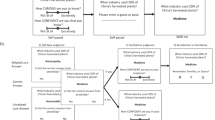Abstract
Background and aims
Familiarity is assumed to exert a beneficial effect on memory in older adults. Our paper investigated this issue specifically for destination memory, that is, memory of the destination of previously relayed information.
Methods
Young and older adults were told familiar (Experiment 1) and unfamiliar (Experiment 2) proverbs associated with pictures depicting faces of celebrities (e.g., Elvis Presley) or unknown people, with a specific proverb assigned to each face. In a later recognition task, participants were presented with the previously exposed proverb–face pairs and for each pair had to decide whether they had previously relayed the given proverb to the given face.
Results
In general, destination performance was found to be higher for familiar than for unfamiliar faces. However while there was no difference between the two groups when the proverbs being relayed were unfamiliar, the advantage of face familiarity on destination memory was present only for older adults when the proverbs being relayed were familiar.
Discussion and conclusions
Our results show that destination memory in older adults is sensitive to familiarity of both destination and output information.



Similar content being viewed by others
References
Ebbinghaus H (2013) Memory: a contribution to experimental psychology. Ann Neurosci 20(4). doi:10.5214/ans.0972.7531.200408
Greene R (2008) Repetition and spacing effects. Learn Memory 2:65–78. doi:10.1016/b978-012370509-9.00168-6
Peterson DJ, Mulligan NW (2012) A negative effect of repetition in episodic memory. J ExpPsychol Learn Mem Cogn 38(6):1786–1791. doi:10.1037/a0028220
Mayr U (2008) Introduction to the special section on cognitive plasticity in the aging mind. Psychol Aging 23(4):681–683. doi:10.1037/a0014346
Schatz TR, Spranger T, Knopf M (2010) Is there a memory profit after repeated learning of subject-performed actions? Comparing direct and long-term memory performance level as a function of age. Scand J Psychol 51(6):465–472. doi:10.1111/j.1467-9450.2010.00828.x
El Haj M, Postal V, Allain P (2013) Destination memory in Alzheimer’s disease: when I imagine telling Ronald Reagan about Paris. Cortex 49(1):82–89. doi:10.1016/j.cortex.2011.11.014
El Haj M, Postal V, Le Gall D, Allain P (2013) Destination memory in mild Alzheimer’s disease. Behav Neurol 26(3):215–216. doi:10.1155/2013/734565
Gopie N, MacLeod CM (2009) Destination memory: stop me if I’ve told you this before. PsycholSci 20(12):1492–1499
El Haj M, Moroni C, Luyat M, Omigie D, Allain P (2014) To what extent does destination recall induce episodic reliving? Evidence from Alzheimer’s disease. J Clin Exp Neuropsychol 36(2):127–136. doi:10.1080/13803395.2013.869309
El Haj M, Allain P, Kessels RP (2014) The cognitive and neuroanatomical underpinnings of destination memory. Transl Neurosci 5(2):147–151. doi:10.2478/s13380-014-0219-5
Johnson MK, Hashtroudi S, Lindsay DS (1993) Source monitoring. Psychol Bull 114:3–28. doi:10.1037/0033-2909.114.1.3
Mitchell KJ, Johnson MK (2009) Source monitoring 15 years later: what have we learned from fMRI about the neural mechanisms of source memory? Psychol Bull 135:638–677. doi:10.1037/a0015849
Gopie N, Craik FI, Hasher L (2010) Destination memory impairment in older people. Psychol Aging 25(4):922–928. doi:10.1037/a0019703
El Haj M, Caillaud M, Verny C, Fasotti L, Allain P (2014) Destination and source memory in Huntington’s disease. J Neuropsychol. doi:10.1111/jnp.12057
Poppenk J, Kohler S, Moscovitch M (2010) Revisiting the novelty effect: when familiarity, not novelty, enhances memory. J ExpPsychol Learn Mem Cogn 36(5):1321–1330. doi:10.1037/a0019900
Poppenk J, McIntosh AR, Craik FI, Moscovitch M (2010) Past experience modulates the neural mechanisms of episodic memory formation. J Neurosci 30(13):4707–4716. doi:10.1523/jneurosci.5466-09.2010
Poppenk J, Norman KA (2012) Mechanisms supporting superior source memory for familiar items: a multi-voxel pattern analysis study. Neuropsychologia 50(13):3015–3026. doi:10.1016/j.neuropsychologia.2012.07.010
Dulas MR (2011) The effect of explicitly directing attention toward item-feature relationships on source memory and aging: an ERP study (Doctoral dissertation). Georgia Institute of Technology, GA
Kim K, Yi DJ, Raye CL, Johnson MK (2012) Negative effects of item repetition on source memory. Mem Cogn 40(6):889–901. doi:10.3758/s13421-012-0196-2
de Castro JM, de Castro ES (1989) Spontaneous meal patterns of humans: influence of the presence of other people. Am J Clin Nutr 50(2):237–247
Baudouin J-Y, Gilibert D, Sansone S, Tiberghien G (2000) When the smile is a cue to familiarity. Memory 8(5):285–292. doi:10.1080/09658210050117717
Folstein MF, Folstein SE, McHugh PR (1975) “Mini-mental state”. A practical method for grading the cognitive state of patients for the clinician. J Psychiatr Res 12(3):189–198
Deltour J (1993) Echelle de vocabulaire de Mill Hill de JC Raven. Adaptation française et normes européennes du Mill Hill et du Standard Progressive Matrices de Raven (PM38) Braine-le-Château: Editions l’application des techniques modernes
Peirce JW (2007) PsychoPy—psychophysics software in Python. J Neurosci Methods 162(1–2):8–13. doi:10.1016/j.jneumeth.2006.11.017
El Haj M, Fasotti L, Allain P (2012) Source monitoring in Alzheimer’s disease. Brain Cogn 80(2):185–191. doi:10.1016/j.bandc.2012.06.004
Leary MR, Nezlek JB, Downs D, Radford-Davenport J, Martin J, McMullen A (1994) Self-presentation in everyday interactions: effects of target familiarity and gender composition. J Pers Soc Psychol 67(4):664–673. doi:10.1037/0022-3514.67.4.664
Lamarche L, Gammage KL (2010) The effects of leader gender on self-presentational concerns in exercise. Psychol Health 25(7):769–781. doi:10.1080/08870440902866886
Craik FI, Luo L, Sakuta Y (2010) Effects of aging and divided attention on memory for items and their contexts. Psychol Aging 25(4):968–979. doi:10.1037/a0020276
Hancock PJ, Bruce VV, Burton AM (2000) Recognition of unfamiliar faces. Trends Cogn Sci 4(9):330–337
Acknowledgments
The authors would like to thank Dr. Jordan Poppenk for helpful comment and approving the use of proverbs.
Conflict of interest
None.
Author information
Authors and Affiliations
Corresponding author
Rights and permissions
About this article
Cite this article
El Haj, M., Omigie, D. & Samson, S. Destination memory and familiarity: better memory for conversations with Elvis Presley than with unknown people. Aging Clin Exp Res 27, 337–344 (2015). https://doi.org/10.1007/s40520-014-0286-z
Received:
Accepted:
Published:
Issue Date:
DOI: https://doi.org/10.1007/s40520-014-0286-z




